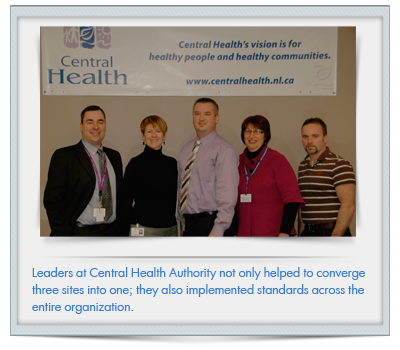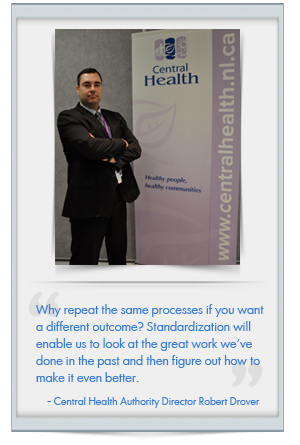A Canadian health authority takes an unconventional approach.
Three health regions within Central Newfoundland were about to embark on the implementation of advanced clinical modules of their MEDITECH EHR, when they received a new mandate from the provincial government to merge into Central Health Authority.
With well-implemented MEDITECH systems at each organization, Central Health Authority Director Robert Drover wanted the convergence to be a stepforward for all three sites. So he came up with the idea of using the initiative as an opportunity to implement standards across the health authority.
"I had to look at this consolidation from a value-added perspective, and determine where we would get the most benefit from all of the effort we had already put in," Drover says. "I discovered that standardization would move the entire organization forward by improving the quality of the data we collect and keeping our patients even safer."
 Taking the Road Less Traveled
Taking the Road Less Traveled
Drover knew that pooling two major projects into one would be riskier and more resource-intensive than handling them separately, but felt the end result was worth it; so, he took the plan to MEDITECH and the MEDITECH Solutions Group within Dell.
"Both partners said that layering the standards project on top of consolidating separate information silos had never been done before, and would require a lot of work and tremendous change. But, standardization would also mean we'd have better information for better decision-making, thus reducing safety risks for our patients," he explains.
MEDITECH and its Dell counterparts helped Drover develop a strategy that included solutions to possible roadblocks. This plan won the support of Central Health Authority's executive board. "Standardization struck a chord with them, because we're all striving to improve information management, whether it be at the bedside or in the boardroom," says Drover.
Making Change
Next, Drover needed to sell the project to clinicians and staff, so he brought in Patricia (Pat) Walsh, RN, Central Health's change management coordinator. Walsh, who had been vested in the consolidation project from the start, helped to manage Central's process changes.
"Process changes have the most impact on end-users," explains Walsh, "As an experienced nurse, Pat could apply her extensive knowledge of our MEDITECH system to their clinical workflow. Throughout the initial assessment, she was able to identify change models that required more training in order to ease the transition."
Walsh says all three organizations collaborated to evaluate every parameter and dictionary for potential issues. "Working as a team, we're achieving a single, consensus-based system that reduces duplication and increases data quality, while at the same time creating smarter ways to work," she says. Drover cites one example, from the ED. "Each hospital is currently referring to the chart number and visit type differently. When completed, all EDs will be using consistent terminology and our emergency physicians will view one patient record with data from all Central Health facilities, expediting care and decision-making. They never had access to that patient information before in one place. That's exciting!"
Drover cites one example, from the ED. "Each hospital is currently referring to the chart number and visit type differently. When completed, all EDs will be using consistent terminology and our emergency physicians will view one patient record with data from all Central Health facilities, expediting care and decision-making. They never had access to that patient information before in one place. That's exciting!"
Winning Big from the Start
Today, with nearly 40 percent of the mammoth project complete, Central Health Authority's teams continue to standardize processes and assessments, making improvements when necessary. They're also preparing for a system-wide update, which will bring the entire organization onto the same MEDITECH version.
As data across the health authority becomes more consistent, Drover says they plan to implement more in-depth reporting standards to measure outcomes for quality improvements.
"Our teams are creating benchmark values that otherwise could not have happened without their innovation and drive," he says. "Why repeat the same processes if you want a different outcome? Standardization will enable us to look at the great work we've done in the past and then figure out how to make it even better."